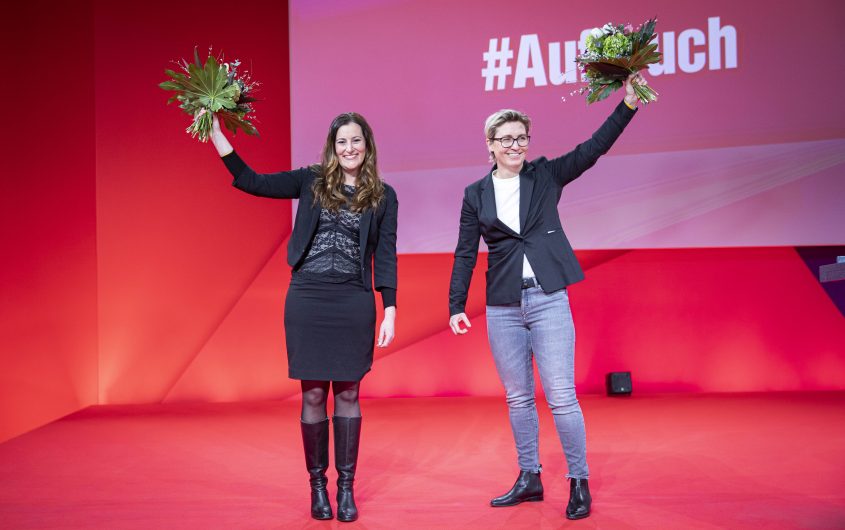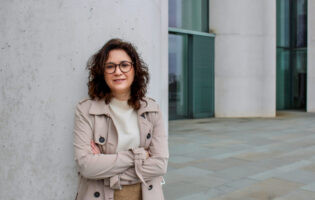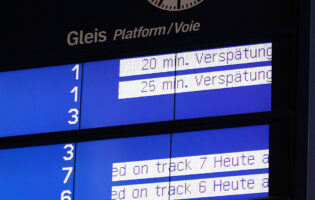
DIE LINKE via Flickr
The Left Party in the 2021 Election Campaign
Gabriele Zimmer
Gabriele Zimmer was born in the German Democratic Republic in 1955. In 1977 she graduated from the Karl-Marx-University Leipzig with a degree in Russian and French interpretation. From 1977 to 1989 she worked as a journalist and party functionary of the communist Socialist Unity Party (SED) for a company in the metal industry. In 1990 she co-founded the Party of Democratic Socialism (PDS) in the state of Thuringia, serving as chairwoman until 1998. From 2000 to 2003 she was the national chairwoman of PDS before it became the Left Party and from 2004 to 2019, she was a member of the European Parliament, including eight years as chairwoman of the left-wing group European United Left/Nordic Green Left (GUE/NGL).
Fourteen years ago in 2007, the party named Die Linke was formed from the merger of the Party of Democratic Socialism (PDS) and Labour & Social Justice – The Electoral Alternative (Arbeit und soziale Gerechtigkeit – Die Wahlalternative, WASG). Their membership and their supporters at that time embodied the most diverse spectrum of the political left and trade union movement from more than sixty years of German-German history. Forty years of division had also led to forty years of divided development of leftist forces, including differences in language and political culture. But by today, more and more people who came of age politically after the fall of the Berlin Wall are determining the direction of the party. Die Linke has more than 60,000 members and is represented in many municipal councils, in state parliaments (Landtage), in the Bundestag, and in the European Parliament. In Berlin and Bremen, Die Linke forms government coalitions with the Social Democrats (SPD) and the Greens. In Thuringia, the party leads the governing coalition and holds the premiership. The party is close to social and peace movements and represents positions advocating for a socio-ecological transformation, calls for more direct democracy, and strongly opposes foreign deployments of the Bundeswehr. Thirty-seven percent of the members are women. Die Linke is a member of the European Left Party.
The coronavirus pandemic has also shown the catastrophic consequences of neoliberal policies in Germany, of saving public infrastructure and public services. After decades of neoliberal policies, more and more people are demanding a more activist and regulatory state.
Despite conventional wisdom, a change of government is possible. Angela Merkel, who enjoys a high degree of trust as chancellor, is not running again, and her CDU/CSU coalition is currently sinking into leadership chaos after a prolonged decision-making process to determine her replacement as CDU leader and Union chancellor candidate. Since February, their support in the polls has dropped by almost ten points. There are many indications that levels of voters’ support for the Greens and the Conservatives are converging.
The Left’s New Direction
Die Linke is faced with the challenge of presenting itself as a left-wing alternative social force and significantly increasing its electoral potential. Is it able to win votes, particularly among workers in industry and services, in the precariat, in rural areas, and among non-voters?
In the summer of 2020, Die Linke published a text in which they advocated for the party to be part of a possible red-red-green government after the next Bundestag election. But the various leftist parties’ positions differ regarding the social balances of power, the possibilities of social change, and the will to change. The plan to win over voters, especially from the Greens and the SPD, was misplaced. First, we take the voters away from them, but then we want to form a coalition?
Most recently in February, the party congress took place. Die Linke elected a new board, and there is talk of a new departure. Young people, many of whom belong to the newly-founded Movement Left (Bewegunslinke), will hopefully break the paralysis. They stand for a sustainable departure and recovery, a breath of fresh air. Two younger women currently lead the party, and both have experience as chairwomen of state parliamentarian groups: Janine Wissler in the state of Hesse, Susanne Hennig-Wellsow in the state of Thuringia. They represent different wings (Wissler the anti-capitalist left and Hennig-Wellsow the pragmatic realos) as well as western Germany and eastern Germany.
The Party Program
The first draft of Die Linke’s election program was revised and put into public discussion on April 12. The one-sided orientation towards government participation has been deleted. The party presented a program on a wide variety of topics, but on some in particular Die Linke can drive developments from the left.
For example, the party demands a different social rent policy in Germany. On April 15, the Federal Constitutional Court declared the rent cap adopted by the red-red-green government in the capital Berlin to be invalid. The main issue was if the state law infringed on the federal government’s already-existing rent regulation. It is clear that new laws are needed at the federal level to enforce a different rental policy for a right to affordable housing, against evictions into homelessness, for a rent freeze wherever the situation arises in Germany’s tight housing market. Die Linke also calls for speculation with housing on the stock exchange to be stopped and global real estate groups to be expropriated. In Berlin in particular, dealing with Vonovia, Deutsche Wohnen, or Black Rock also plays a major role. There is a strong alliance between Die Linke and various tenant initiatives.
A Proactive Strategy
Die Linke relies on cooperation and pressure from broad initiatives such as Fridays for Future, trade unions, social and environmental associations, tenant initiatives, roundtables for alternative energies, feminist initiatives as well as initiatives for peace and disarmament. It reiterates its call for an end to all Bundeswehr operations abroad. The fight against racism, discrimination, right-wing violence, and anti-Semitism continues to be actively led by Die Linke. Based on the election program, Die Linke now needs a well-thought-out election campaign, to field good candidates, and to mobilize the members and supporters for the campaign.
We are now at a crossroads in Germany. The question, however, is not whether a change of direction in politics is taking place, but in which direction it can be steered. The offensive by right-wing forces such as the AfD, opponents of Corona measures, right-wing extremists, nationalists, and violent forces in Germany is resonating in parts of the population. A political alternative to neoliberal politics requires social pressure, political struggles, and solidarity. Die Linke needs to prove itself as an offensive mobilizing, organizing, and integrating political force for the socio-ecological change of direction and a new international policy in Germany and in the EU. Otherwise, it risks being marginalized or crushed in the election campaign between the apparent electoral alternatives CDU/CSU and the Greens.
It is fundamental for the Die Linke to overcome the stagnation of the last years. Poll ratings are stable between 7 and 8 percent, but not above the results of the Bundestag elections from 2005 to 2017.
In the last two years, the SPD made an initial slight course correction, and trade unions as a whole turned back to the SPD. Topics for which Die Linke also stood (combatting poverty and its generative social structures, more direct democracy, sustainable socio-ecological transformation) were hardly found in the media. The original function of Die Linke and its founding myth have survived. The party has to be able to turn from being a stalwart defender of neglected social interests into a champion of a comprehensive socio-ecological and peace-political transformation, to organize necessary debates, and to learn from other leftist forces how to do it. Thus, Die Linke has to present itself as a democratic socialist party. A party of emancipation, solidarity, and peace.
Whether Die Linke wants it or not, it must make itself fit for the future. There is no time to lose.









